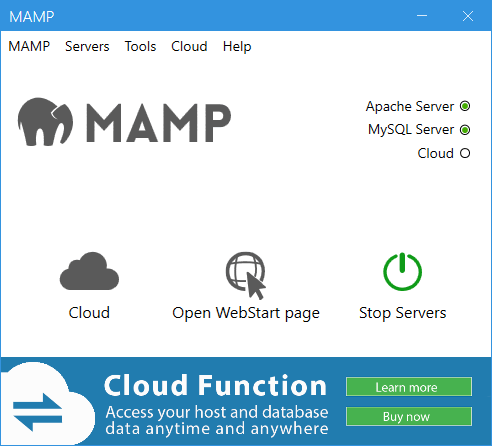How to set up virtual hosts on Windows
Overview
PHP developers know that they can only have one domain per server, which is http://localhost. However, what if we wanted to have more than one project? It’s simple! Under the root of our server, we can separate projects into different folders and access them as follows:
http://localhost/projectAhttp://localhost/projectB
This solution seems to be appropriate, but:
- It does not reflect all the realities in the production server, where each site has its own domain (
http://projectA.com). - You may encounter issues with relative paths.
Given these reasons, it’s recommended to have a local environment that looks a bit similar to the production one.
In this shot, we’ll learn how to set up a virtual host on a Windows machine.
First, let’s make sure we have everything we need to get started.
Prerequisites
- Be on a Windows machine.
- Have a LAMP environment installed. For example MAMP for Windows.
- In the root of your server (
htdocson MAMP), create a folder for our project withunigrasysas it name. You can put a basic PHP “hello world” insideindex.php.
In the next step, we’ll set up a virtual host for a website called http://unigrasys.local.
Create a new virtual host
To add a new virtual host, we need to edit the configuration file httpd-vhosts.conf. This file is located at C:\MAMP\bin\apache\conf\extra\httpd-vhosts.conf.
With your editor, open the configuration file and at the end of the document add the code snippet below.
<VirtualHost *:80>
DocumentRoot "C:\MAMP\htdocs\unigrasys"
ServerName unigrasys.local
ServerAlias www.unigrasys.local
</VirtualHost>
Apache configuration files use directives to set rules that should be followed by the server.
DocumentRoot: This specifies the path from which the server will serve files.ServerNameandServerAlias: The domain name we want the server to respond to. In our case, the server will respond tohttp://unigrasys.localandwww.unigrasys.local.
Note:
- You should not add a trailing slash on
DocumentRootdirectory path.- Windows does not allow domain names with
.dev.
Register the new virtual hostname
After we create our new domain, we allow the computer to recognize it.
To register a host name, we need to edit the hosts file, which is located at C:\Windows\System32\drivers\etc\hosts. At the bottom of the file, add the name of your virtual host.
127.0.0.1 unigrasys.local
The hosts file requires administrator privilege to edit. See the note below on how to do so.
Note: How to open a file as admin:
- Open Notepad (or any text editor) as admin.
- Open the file from Notepad with “Ctrl + O”.
- Edit and save.
Enable virtual host conf
This is the last step. Virtual host is disabled by default. The file responsible for this is httpd.conf. Let’s edit it.
Go to C:\MAMP\conf\apache and open httpd.conf.
Find the line below:
# Virtual hosts
# Include conf/extra/httpd-vhosts.conf
Now we’ll uncomment the line.
# Virtual hosts
Include conf/extra/httpd-vhosts.conf
That’s all! Restart MAMP (or whatever LAMP stack you have) and enjoy your new domain!
Conclusion
Virtual hosting is a technique used to allow one web server to host more than one domain. The most used virtual hosting type is the name-based one.
In this shot, we learned how to create a virtual host on Windows. We successfully completed the following steps:
- Create a new virtual host in
httpd-vhosts.conffile. - Register it in the
hostsfile. - Enable virtual host in
httpd.conf.
Note: To learn how to create a virtual host on GNU/Linux, visit this Answer.
